Japanese Society of Myeloma
一覧はこちらMessage from President

Shinsuke Iida,
Japanese Society of Myeloma (JSM) President
Professor and Chairman, Department of Hematology and Oncology, Nagoya City University Institute of Medical and Pharmaceutical Sciences
In May 2024 I had the great honor of being appointed president of the JSM. Its predecessor, the JMSG, was founded in 1976. Forty-eight years later, the JSM has become an academic society where members interested in the clinical treatment of and research into multiple myeloma (MM) and its related disorders can discuss their work and ideas without hindrance. Socially, the JSM has important roles in the promotion of team medicine, supported by various medical staffs, and in cooperation with patient groups and regulatory agencies.
There has been a revolution in MM treatment since the end of the 20th century. Together with an understanding of molecular pathogenesis and marrow microenvironments in MM patients, proteasome inhibitors, immunomodulatory drugs and monoclonal antibodies have become used as the standard of care. In addition, the recent introduction of specific immune therapies such as chimeric antigen T-cell (CAR-T) therapy and T-cell engagers has resulted in further improvements in the survival of patients with MM. In the current era, with novel drugs being developed rapidly, we must also pay attention to improvements to the quality of life (QOL) of patients with less toxic agents.
In the JSM’s academic meetings, basic scientists and clinical hematologists sit together and discuss various problems to be solved in the management of MM. We also hold international symposiums, cooperating with the International Myeloma Society (IMS) and Asian research groups such as the Korean MM Working Party (KMMWP) to exchange information. Distances between colleagues have shortened through the web and since the COVID-19 pandemic. To adjust to this change, we would like to provide opportunities for discourse with overseas researchers to our younger JSM members.
Besides its academic meetings, the JSM publishes its “Guideline for Diagnosis and Treatment of MM” every four years, and updates it annually. We provide Educational Seminars and Educational Lectures, intended for JSM members and medical staffs taking care of patients with MM, so that patients everywhere may benefit equally. We keep JSM members informed about the latest information. In cooperation with related academic societies such as the Japanese Society of Hematology (JSH), the JSM plays its part in supporting medical teams taking care of MM patients and their caregivers.
I will do my best to enable the JSM to develop further, together with our Vice Presidents and Executive Directors, who share the same mission. Novel ideas from society members are also welcomed. I am looking forward to working with JSM members to further improve treatment outcomes and comprehensive care for patients with MM and its related diseases.
Sincerely,